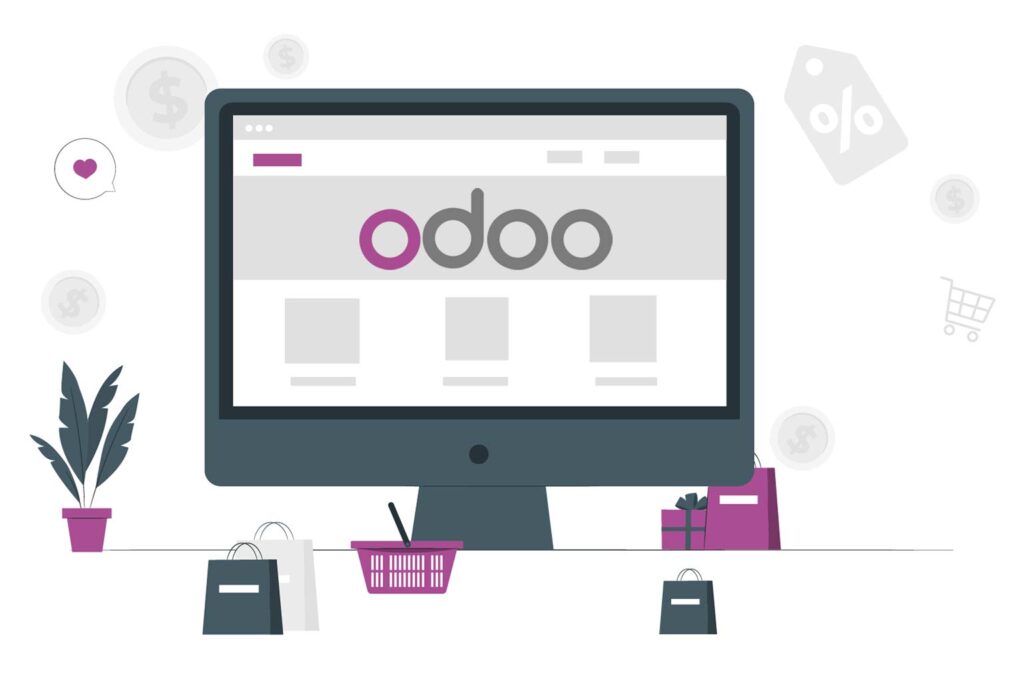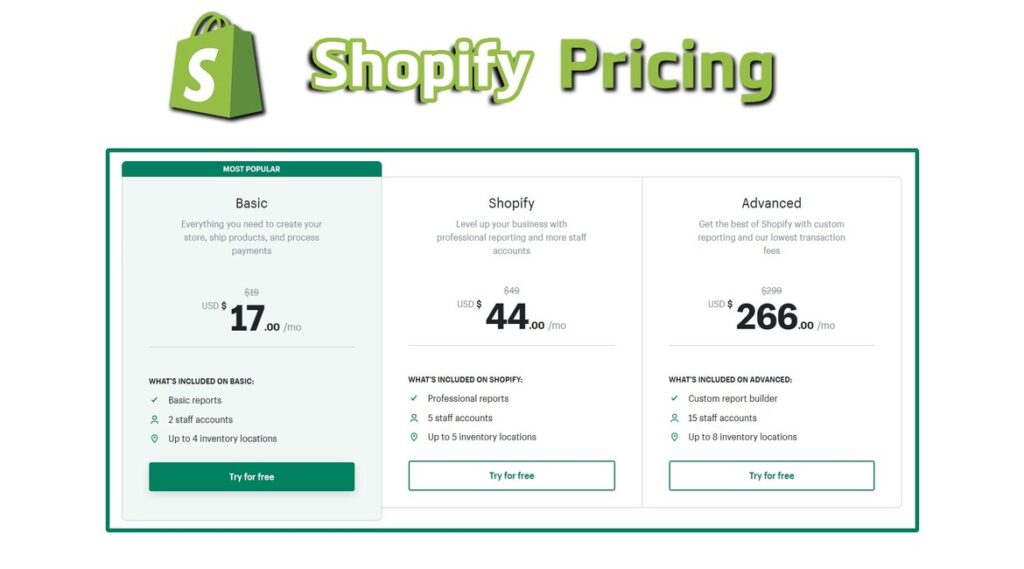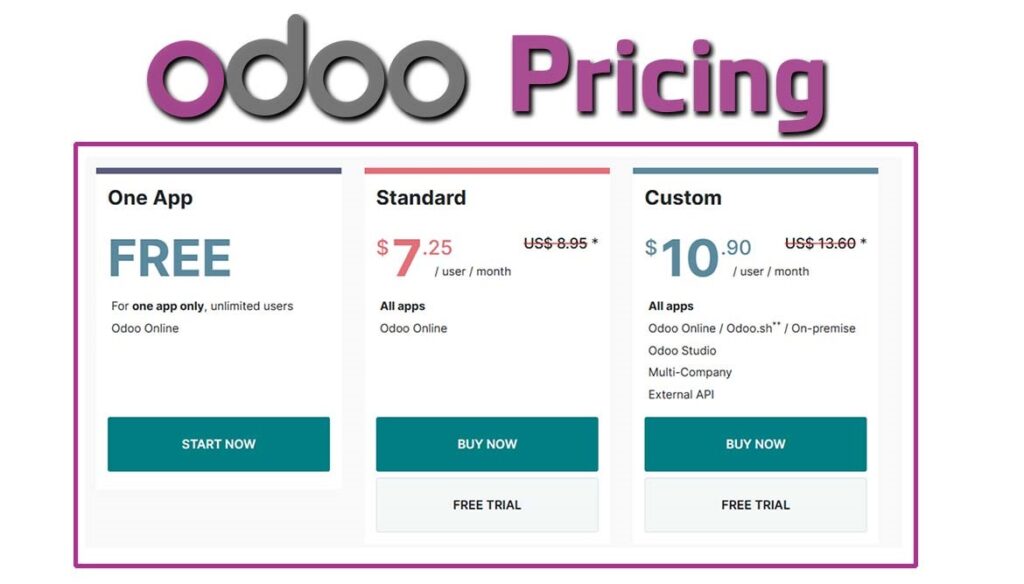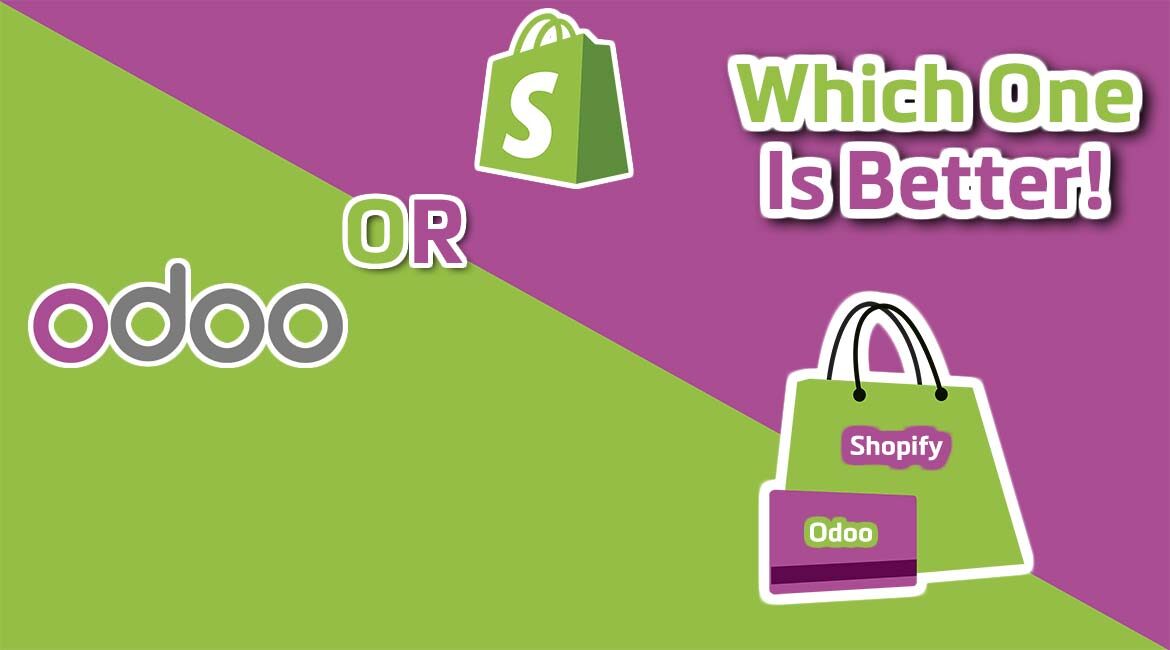Choosing Shopify OR Odoo? | Which One is Better? | Guide 2023
eCommerce is quickly becoming the most popular revenue source for businesses. eCommerce platforms like Shopify and Odoo offer a variety of tools to help you expand your business, regardless of whether you want to sell online or through your physical store.
Shopify is an eCommerce platform that can manage payments, create websites with product lists, and more. The Shopify App Store, which offers templates for restaurants and boutiques, is one of its most well-liked features.
Another eCommerce platform made for small and medium-sized businesses is Odoo. With an integrated ERP system, it offers comprehensive tools for managing orders, inventory, and point-of-sale systems.
We’re going to further categorize it and what sets these two systems apart and which you should select for your business!
Understanding Shopify
Shopify is a Canadian retail platform founded in 2004 by Tobias Latke, Daniel Weinland, and Scott Lake that provides merchants with everything they need to start an online store, including software. Focusing on what matters to merchants is Shopify’s goal.

What types of companies use Shopify?
Shopify caters to every type of business, from small startups to enterprise situations. They supply further than 600,000 businesses worldwide, which are all powered by Shopify’s robust eCommerce platform.
Startups find Shopify appealing because they don’t require long-term contracts or expensive setup fees. You can even customize and expand your business by adding powerful features from their App Store.

What are Shopify’s features?
Some of Shopify’s most popular features are:
- The Shopify Lite App, which makes it possible for merchandisers to launch stores without demanding any rendering knowledge
- The POS system
- Businesses can use their own domain using their Custom Domain feature without requiring any additional setup or technical expertise.
Shopify’s core products are:
the Shopify Store, which lets you host up to three websites in a single store.
the App Store, where app developers can sell their apps, and Shopify Payments, which is a complete point-of-sale system.
Shopify also offers two service products: Hire Shopify Expert and Web shop Apps. Web shop Apps is designed for businesses that need help setting up their online store but don’t want to hire an expert yet.
The Hire Shopify Expert service assists in turning your idea into a living and breathing-commerce website with all the bells and hisses.
How is Shopify hosted?
Shopify’s data centers are located in the US, but utmost website content is hosted locally on their Content Delivery Network.
Understanding Odoo
Since its inception in 2005, Odoo has provided point-of-sale systems, enterprise resource planning, and other eCommerce tools. Users can automate and streamline business functions thanks to this.
Odoo aims to help businesses become more efficient by automating their processes, with nearly 120,000 customers in over 160 countries.
Odoo stands out from competitors in this sector thanks to its open-source, low-cost, and free business model.
The company’s founder and CEO, Fabien Pickers, created it to “fill a gap in the market” for open-source ERP systems. “We launched Odoo with the goal of making ERP available for everyone to use,” he was said to have said.

What types of companies use Odoo?
Odoo has a very diverse customer base, including eCommerce websites, with more than five million users. Furthermore, because it is so adaptable, Odoo is usable by businesses in any sector.
Odoo is used by a lot of big businesses, but startups can also use the free version, which you can make work with a little more work. Additionally, because you can add modules as you need them, it will expand with your business.
What are Odoo’s features?
You can mix and match any thirty main modules in Odoo. These include:
- CRM
- Warehouse Management
- Project Management
- Point of Sale (POS)
- Sales Management
- Manufacturing
- Accounting
- Purchase Management
However, this is only the beginning, as thousands of other apps have been developed by third parties.

How is Odoo hosted?
There are a few different options. Cloud hosting or on-premise hosting are two major options for businesses. The conventional cloud choice is limited since there is no third-party support, yet Odoo.sh covers this.
Should Your eCommerce Company Use Shopify or Odoo?
Accounting, product management, inventory management, and customer management are just a few of the many features of Odoo. Managers can use the reporting and analytics tools it provides to make better decisions.
Similar to Odoo, Shopify offers online store design templates and apps to make store management simpler for users.
The cost of these two platforms is one of their main differences: Shopify charges $29 per month, plus a 14% transaction processing fee, while Odoo charges $10 per month.
We can assist you if you believe Odoo is the right choice for you but are hesitant due to the entry barrier! Conflans is an Odoo Partner with extensive experience in tailoring software to a business’s specific needs. To get started, schedule a no-cost consultation right now.
WHICH ONE TO CHOOSE? ODOO OR SHOPIFY!
Odoo vs Shopify are both types of “CRM” and “E-commerce” platforms. With Shopify, you’re offered the customized layout of your online store and 100 seductive templates. Whereas, Odoo provides druggies with crucial features like website development, and client relationship development.
With real stoner reviews concentrated on functionality, ease of use, client support, and value for plutocrat, we ’ll compare and differ the parallels and differences between Shopify vs Odoo results below.

FEATURES AND FUNCTIONALITIES
Both systems excel in terms of their capabilities and features. They both have CRM options and robust eCommerce features.
Shopify features list consists of the following:
- Numerous handy drop shipping integrations
- Stylish SEO strategies are supported
- Store-mails that are automatically generated
- force operation made simple
- Unlimited bandwidth web hosting
- A useful analytics dashboard
- There is an app for your mobile device from Shopify
Odoo has an affable stoner interface and a number of useful features, similar as easy configuration, flawless integration, and customization. It’s a centralized strategy on a modular frame.
There are thirty main modules in Odoo, which you can combine as needed. Among them are:
- CRM (client operation)
- storehouse Administration
- Point of trade Project Management (POS)
- operation of Deals
- Manufacturing/ Accounting
- Management of Purchas
BACK- END FUNCTIONS
The Shopify backend lets you handle tasks in a dynamic way. Themes could theoretically be changed frequently whenever necessary on a small Shopify website.
Your store and vital consumer data will be shielded if you maintain it behind Shopify’s strong firewall. To boost your guests’ trust, we might declare that your Shopify Store has top- notch security.
Shopify also allows you to integrate with thirty- party mate’ themes and plugins. In addition, Shopify offers multiuser logins and ultramodern programming.
Shopify druggies can also take advantage of mobile Shopify apps, mobile cybersurfed support, data coagulate results, and pall- grounded editing.
On the other hand, Odoo is an excellent result for small and medium enterprises since it offers both an easy- to- manage store and a robust reverse- end system.
With this program, you can manage all of your accounts, checks, force, CRM, procurement, and other tasks from a single terminal.
SETUP AND CUSTOMIZATION
While other-commerce platforms take a long time to learn and bear expansive training businesses can save a lot of time launching a Shopify store, as it only takes a couple of twinkles.
This includes setting your common design, paying processing, and any apps that your online shop might bear.
Though you ’ll need to get shaped to the Shopify interface and maybe read a many shoplifty tutorials, the Shopify dashboard is about as stoner-friendly as it gets.
Shopify Plus allows you to customize everything that matters to moment’s online shoppers, including themes, particulars, abatements, checkouts, and payments.
Odoo is also plain to use and set up. You may produce an-store without expansive technological knowledge. This programmed has a variation of Odoo contents to help you ameliorate your online shop Your wo not need to hire a professional to set up your-commerce website moreover.
likewise, the free community interpretation of the Odoo platform has been embedded for easy installation and free downloading. novices and experts both like Odoo’s usability, as well as the broad customization abilities.
SEO FEATURES
Search appliances optimization is criticizing for every online occupation success. Both Odoo and Shopify include all of the features you could anticipate from a full- featured pall- grounded platform.
Shopify SEO refers to a place of SEO tweaks specific to the Shopify programmed. With Shopify SEO, you can set up a store that’s both technically sound and targeted to what implicit buyers anticipate.
Shopify comes with a number of SEO capabilities out of the box It covers everything from creating your store to optimizing each runner, attaining fast lading times, expanding internationally, and bringing in further organic callers.
On the other hand, Odoo objectifications all the specialized complexity of SEO and handles everything for you, in the stylish possible way, to insure that Odoo Website and Odoo eCommerce druggies have fantastic SEO.
Odoo can automatically induce the title and meta description grounded on the runner title and content. either, Odoo has a keyword finder to help you produce high- quality content and increase organic business.
Odoo also offers numerous modules that can help you in producing content for your website and numerous features for mass sharing content on social media.
CUSTOMER MANAGEMENT FEATURES
A customer management system (CMS) is required by every e-commerce platform. There are distinct customer management features on both platforms.
After a customer makes a purchase from your Shopify store, Shopify will immediately add their personal information to your customer list.
Shopify will automatically create a customer profile whenever a customer interacts with your business, such as by signing up for your mailing list or creating an account. From your Shopify admin, you can send emails to individual customers or use customer segments to send discounts and emails to them.
Customer Relationship Management, on the other hand, is one of the aspects that Odoo focuses on in particular CRM modules. From acquiring leads to converting them into potential customers, the Odoo CRM module will provide an interface for all aspects of customer management.
In addition, customer management can be completed by following up with them and ensuring their return when they make another purchase.
HOSTING AND SECURITY ASPECTS
Hosting is the reason your e-store goes live online. Security, on the other hand, ensures that it is completely safe and resistant to hacking. Odoo does not waver in this regard.
There are additional features like shared SSL, tracking of SQL injection, monitoring of suspicious activity, regular backup, and data encryption. Data encryption, cache options, and dedicated SSL are just a few of the features offered by both platforms.
Shopify has some security flaws compared to Odoo. However, Shopify has recently implemented a number of security measures to safeguard customer data.
The fraud prevention system at Shopify is good because it flags orders that might be fraudulent and requires manual review before processing them. In addition, the backend of Shopify is protected by a user permission scheme.
ADMINISTRATIVE FEATURES
These managerial highlights make your e-store run as expected and proficiently. When contrasted with Odoo, Shopify offers less administrator highlights.
Mass request handling and mass item import/trade modules are not accessible in Shopify. In the meantime, Odoo has Programming interface support as well as client authorizations and jobs.
Advancement AND Advertising Highlights
It’s basic to develop traffic and convert guests into purchasers after you’ve sent off your store. Fostering a promoting plan will assist you with picking showcasing strategies that are appropriate for your store, whether you sell on the web or face to face. In this perspective, the two stages offer an exhaustive arrangement of modules for site advancement and promoting.
As a SaaS stage, Shopify misses the mark on key advancement highlights contrasted with Odoo, like item examination, and item creation, which could be compensated for utilizing Shopify applications Still, there are various showcasing devices accessible to help you in advancing your Shopify store.
From the Advertising page in Shopify, you can get promoting proposals and assemble showcasing exercises and mechanization. As referenced beforehand, you can work on your website optimization for a higher positioning in web search tools or virtual entertainment.
Clients can likewise use markdown codes in your web-based store or in an actual area. You can likewise run advancements in your store, like occasional deals and blaze deals, to help traffic and income.
Essentially, you might lay out robotized and designated promoting efforts with Odoo. Odoo helps you in dividing your possibility data set so you can send the right message to the right possibility.
Besides above, Odoo might make progressed showcasing processes that are fixated on your possibilities and support them successfully through your deals channel, 24 hours per day, seven days every week.
INVENTORY MANAGEMENT FEATURES
Inventory is the quantity of a product that is available for purchase. You can avoid selling out-of-stock items and be notified when you need to order or manufacture more of your product with the help of inventory tracking.
Also you can see your inventory, modify its levels, and set up inventory tracking in the Inventory section of Shopify. You can also see the history of inventory changes for products and variants whose inventory is tracked by Shopify. You can look at how levels of inventory have changed in the Inventory Reports section of Shopify.
Odoo Inventory Management, on the other hand, uses unique, well-designed operational instruments to meet comprehensive and realistic operational requirements to manage every aspect of a company’s warehouse.
Additionally, you will be able to oversee numerous warehouse management functions for a company using the Odoo platform. Worldwide businesses and establishments with multiple warehouses will benefit from this.
PAYMENT AND PRICING FEATURES
You can provide customers with a variety of payment integrations with Shopify. Customers can pay with credit cards by using Shopify Payments or a third-party service.
PayPal, Facebook Pay, Amazon Pay, and Apple Pay are other payment options that customers can use to make online payments without a credit card. In contrast to Shopify, the Odoo platform permits Worldline SIPS integration.
While both e-commerce software support multiple payment gateways and traditional payment systems like PayPal, Odoo does not currently support recurring payments or multi-currency/multi-providers
It is crucial for an e-commerce store to be able to provide accurate reports that can be used to grow the business in the future. You can use Odoo to create in-depth sales reports that include information about sales, inventory, and product performance.
Stock reports, invoicing, A/B testing reports, deals synopsis reports, and different reports are accessible, contingent upon your business needs.
Odoo Reporting
In the meantime, Shopify reports are grouped by the kind of information they show. You can view a variety of reports, depending on the subscription plan you choose for Shopify.
On both platforms, traffic analytics is also available. In particular, Shopify provides a number of analytics tools to help users make informed business decisions that will boost sales and make the website work better.
COST / PRICING
Following are the pricings (Latest) for both platforms:
Shopify Pricings:
In shopify Basic plan, they charge #17/Month, Shopify plan goes to $44/Month and Advance Plan goes up-to $266/Month, all of shopify plans comes with free trial as well.

Odoo Pricing:
In Odoo One App plan, they charge $0/Month (FREE), $7.25/Month with free trial and in Custom Package they charge $10.90 which comes with free trial as well.

WHAT TYPES OF COMPANIES SHOULD USE SHOPIFY?
Shopify caters to businesses of all shapes and sizes, from start-ups to established corporations. Over 600,000 of their businesses use Shopify’s powerful eCommerce platform, which is used by all of them.
Due to its low setup costs and lack of long-term commitments, Shopify is popular with entrepreneurs. You can even personalize and expand your business by adding powerful App Store features.
With over five million users, Odoo serves an extremely diverse customer base, including eCommerce websites. Furthermore, Odoo is usable by businesses due to its adaptability.
Odoo is utilized by a large number of large businesses, but due to its free version, it is also a great option for startups. As a result, administrators can easily operate the website with a little more effort. Because you can add modules as needed, it will also expand with your business.
LET’S BUILD YOUR DREAM ONLINE STORE
When selecting the best eCommerce platform for your business, there are a number of factors to take into account, as we have seen. What works best for you will depend on your goals, finances, and expertise. Consider your top priorities when choosing between Shopify and Odoo.
Overall, Shopify is a good option if you want to create a straightforward website that only requires minimal upkeep time. Startup businesses that lack the financial resources or technical expertise to invest in a more extensive structure will benefit greatly from this option.
In the meantime, Odoo is a better option if you want a low-cost ERP platform that can be scaled later. I accept it is certainly a mutually beneficial arrangement for firms, all things considered, across all enterprises and areas.
BSS Commerce is confident that it will provide you with the best Odoo and Shopify software development services if you want to establish your own online business.
We are confident in our capacity to be your trailblazer and partner in the creation of an intuitive, sales-driven, and strong technological project. With over 9 years of experience in eCommerce, thousands of customers, hundreds of 5-star reviews, and numerous digital projects under our belt, we are confident in our ability to do so.
Feel free to get in touch with our dedicated experts for pertinent answers to any questions you may have.
As Odoo development company, we also provide eCommerce Solutions based on Odoo, please check them out as well.
Want us to call back? Hit this link.
FAQ’s (Frequently Asked Questions):
- Is Odoo good for eCommerce?
With Odoo eCommerce, the company can get online quickly and easily. Because it is already built in, it eliminates the need for integration with FedEx and DHL services, online payment gateways, eBay stores, and Amazon stores.
- Is Odoo like Shopify?
Both Odoo and Shopify are referred to as “CRM” and “E-commerce” platforms. You can customize the layout of your online store and choose from more than 100 attractive templates with Shopify. Odoo, on the other hand, offers essential features like the development of customer relationships and websites.
- What makes Shopify special?
Shopify provides users with a platform that can be customized, a checkout procedure that is simple to use, and numerous features. Shopify’s ease of use is what sets it apart. You can still use Shopify to make a beautiful and useful online store, even if you don’t know how to code.
- What are advantages of Shopify?
With Shopify, you can quickly launch an online store without having to worry about servers or pay for development like you might with self-hosted platforms like Magento. The administrator connection point is perfect and easy to use and really natural since every one of the highlights are consistently organized.
- What is the use of Odoo?
Odoo is a business management software that is open source and fully integrated. Odoo is a single software solution that combines CRM, sales, project management, manufacturing, inventory management, accounting, HR management, marketing activities, tools for customer support, and other business applications.
Have some time? Visit our website or Instagram page to know more.



